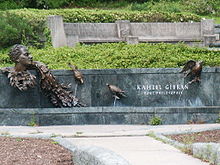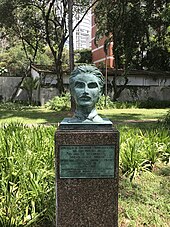Khalil Gibran

Khalil Gibran (born January 6, 1883 as Gibrān Khalīl Gibrān bin Mikhā'īl bin Sa'ad in Arabic جبران خليل جبران, DMG Ǧibrān Ḫalīl Ǧibrān in Bischarri , Ottoman Empire , today Lebanon ; † April 10, 1931 in New York City ) was a Lebanese-American painter , philosopher, and poet .
Life

Gibran emigrated to Boston in the USA in 1895 with his mother, sisters and half-brother . His mother, Kamileh Gibran, was the daughter of the Maronite priest Istiphan Rahmeh. The incorrect spelling of Kahlil Gibran goes back to the Anglicization of his name in the Boston elementary school he attended. In his youth, Gibran was the protégé of the photographer and publicist F. Holland Day .
Gibran studied art, French and Arabic and Arabic literature on his return to Lebanon in 1897 . In 1899 he returned to Boston via Paris . In 1903 his mother, his half-brother Butrus (* 1877) and his younger sister Sultanah (* 1887) died of tuberculosis .
In 1904 Gibran had his first successes as a painter. From 1908 he studied art and European literature in Paris . In 1912 he moved to New York. The short novel Broken Wings , which has autobiographical features and is about an unhappy love story between a boy and his beloved, who is unhappily married, was published in the same year. In 1918 Der Fool (The Madman) appeared , the first book he had written in English. He was the founding president of the Arrabitah literary association. He belonged to the Maronite Church .
Gibran died of liver cancer on April 10, 1931 in New York at the age of 48 and was buried in his birthplace in Lebanon.
Work and thought
The central motifs of his poetry and his philosophical thinking revolve around the idea that life, love and death should be essential for us humans. His work is seen as a link between the philosophical directions of the Orient, e. B. of Sufism , and the western philosophies influenced by Christianity .
The Prophet , published in 1923 (German first edition 1925), is considered the main work and at the same time Gibran's best-known work. Like many of his other writings, it was illustrated by himself.
Gibran wrote most of his early works in Arabic, but from 1918 onwards mainly in English. Above all, his poetic and linguistically painterly pictures are captivating. In his spiritual aphorisms and wisdom, it was always about touching the hearts of his listeners.
Many of his poems were set to music. Particularly well-known are the interpretations of al-Mahabba , an excerpt from The Prophet and Give me the flute and sing from Der Reigen by the Lebanese singer Fairuz .
In 2018, Nadim Naaman and Dana Al Fardan adapted the novel Broken Wings as a musical. It premiered at London's Theater Royal Haymarket .
Fonts
-
The Music , 1905
- dt. The music , translated by Ursula and Simon Yussuf Assaf
- Spirits Rebellious , 1908
-
The Broken Wings , 1912
- German Broken Wings , translated by Ursula and Simon Yussuf Assaf
-
A Tear and A Smile , 1914
- dt. A tear and a smile . Patmos, Düsseldorf 2005, ISBN 3-491-50711-1 , translated by Ursula and Simon Yussuf Assaf
- The procession , 1918
-
The Madman , 1918
- dt. the fool . Patmos, Düsseldorf 2014, ISBN 978-3-8436-0569-4 , translated by Ursula and Simon Yussuf Assaf
- The Forerunner , 1920
-
The Prophet , 1923
- German The Prophet . Patmos, Düsseldorf, 4th edition 2016, ISBN 978-3-8436-0380-5 , translated by Karin Graf
-
Sand and Foam , 1926
- German sand and foam . Walter-Verlag, Zurich 1999, ISBN 3-530-10018-8 ; New translation by Hans-Josef Fritschi, Books on Demand, Norderstedt 2018, ISBN 978-3-7448-5049-0
-
Jesus, the Son of Man , 1928
- dt. Jesus Son of Man . Patmos, Düsseldorf 2013, ISBN 978-3-8436-0011-8
- Secrets of the Heart , 1947

Posthumous publications:
- The Earth Gods , 1931
-
The Wanderer , 1932
- German The Wanderer . Patmos, Düsseldorf 2011, ISBN 978-3-8436-0081-1 , translated by Ursula Assaf
-
The Garden of the Prophet , 1933
- dt. In the garden of the prophet . Patmos, Düsseldorf 2012, ISBN 978-3-8436-0238-9
- Lazarus and his Beloved , 1933
Anthologies with excerpts:
- Whoever never sees suffering will never see joy. Texts for light and dark days . Edited by Ursula and Simon Yussuf Assaf. Patmos, Düsseldorf 2012, ISBN 978-3-8436-0176-4
- Just a secret of life . Edited and translated by Ursula and Simon Yussuf Assaf. Patmos Verlag, Düsseldorf 2012, ISBN 978-3-8436-0237-2
- With Khalil Gibran through the year. A constant companion . Edited by Ursula and Simon Yussuf Assaf. Patmos, Düsseldorf 2007, ISBN 978-3-491-50723-4
Complete edition in German translation
- Khalil Gibran: All works in 5 volumes . Translated and edited by Ursula and Simon Yussuf Assaf. Patmos, Düsseldorf 2012, ISBN 978-3-8436-0569-4
literature
- Jean-Pierre Dahdah: Khalil Gibran. A biography . Translated by Ursula Assaf-Nowak. Walter-Verlag, Zurich 1997 ISBN 3-530-10006-4
- Barbara Young: Kahlil Gibran. The biography. Translated from English by Petra Michel, Karl-Friedrich Hörner and Angela Hoffmann. Aquamarin, Grafing 1994 ISBN 3-89427-025-X
- Raif Georges Khoury: Passé et Présent de la Culture Arabe ou Tradition, Modernité et Conservation d'Identité, selon Djubrān Khalīl Djubrān (1883–1931), à l'image de la Renaissance Européenne . Deux mondes, Edingen-Neckarhausen 1997 ISBN 3-932662-00-8
- Alexandre Najjar: Khalil Gibran and the vision of modernity. A literary biography . Translated by Heribert Becker. Hans Schiler, Berlin 2007 ISBN 978-3-89930-077-2
- Jason Leen: The Death of the Prophet - The powerful Completion of Kahlil Gibran's Immortal Trilogy . Illumination Arts Publishing Company, Bellevue, Wash. 1988, ISBN 0-935699-02-3
- Jonas Bühler: The Prophet's Last Journey - What Khalil Gibran forgot to tell . Benziger Verlag, Zurich 2000 ISBN 3-545-20176-7
Web links
- Literature by and about Khalil Gibran in the catalog of the German National Library
- Portal of Gibran Academy of Arts (English)
- Information article about Kahlil Gibran (English)
- Khalil Gibran's works online (English)
- [1] Transmission of his work "The Prophet" in two languages
- More than 100 citations with sources from the complete works of Khalil Gibran .
- The poems of Khalil Gibran on the portal zgedichte
notes
- ↑ Broken Wings . Retrieved July 22, 2020.
- ^ Becker in the translator database of the VdÜ, 2019
| personal data | |
|---|---|
| SURNAME | Gibran, Khalil |
| ALTERNATIVE NAMES | Sa'ad, Gibrān Khalīl Gibrān bin Mikhā'īl bin (maiden name); Djubran, Chalil |
| BRIEF DESCRIPTION | Lebanese artist and poet |
| DATE OF BIRTH | January 6, 1883 |
| PLACE OF BIRTH | Bisharri , Lebanon |
| DATE OF DEATH | April 10, 1931 |
| PLACE OF DEATH | New York City |
